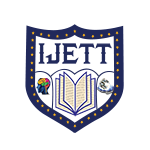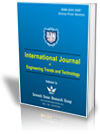Measuring the contribution of conflict resolution dexterity among stakeholders to effective software engineering projects in Nigeria
Citation
Adanma Cecilia Eberendu; Edem Okon Peter Akpan; Emmanuel.C Ubani; Kelvin A. Okorocha "Measuring the contribution of conflict resolution dexterity among stakeholders to effective software engineering projects in Nigeria", International Journal of Engineering Trends and Technology (IJETT), V48(8),415-419 June 2017. ISSN:2231-5381. www.ijettjournal.org. published by seventh sense research group
Abstract
When actions of a stakeholder interfere, obstruct, or make another stakeholders performance ineffective, conflict occurs. Conflict can occur among software engineering stakeholders due to disagreement on methodology, technology, tools to be used, personality, stakeholder requirements, or misconception of the problem which might deprive software project from succeeding. Success is subject to a large extent on whether or not stakeholders have thrived to establish a supportive environment. Conflict among project stakeholders is inevitable, but what is wrong in most cases is the form it takes. For software engineering project to succeed, project organization need to resolve conflict as soon as it is notice. This study empirically evaluates the effect of conflict resolution dexterity to effective software engineering projects in Nigeria. It used survey to gather data from 130 respondents which was analyzed using Pearson correlation coefficient and Regression analysis. It was discovered that conflict resolution dexterity significantly contributes to effective software engineering projects in Nigeria.
References
1) Assudani, R., & Kloppenborg, T. J. (2010). Managing stakeholders for project management success: an emergent model of stakeholders. Journal of General Management , 35 (3), 67-68.
2) Cadle, J., & Yeates, D. (2008). Project management for information systems (5th ed.). Harlow, England: Prentice Hall.
3) Chen, W. T., & Chen, T. T. (2007). Critical success factors for construction partnering in Taiwan. International Journal of Project Management , 25 (5), 475–484.
4) El-Gohary, N. M., Osman, H., & Ei-Diraby, T. (2006). Stakeholder management for public/private partnerships. International Journal of Project Management , 24 (7), 595-604.
5) Freeman, R., Harrison, J., & Wicks, A. (2007). Managing for stakeholders –survival, reputation, and success. US: Louis Stern Memorial Fund.
6) Karn, J. S. & Cowling, A. J. (2008) Measuring the effect of conflict on software engineering teams. Behavior Research Methods, 40 (2), 582-589
7) Li, T. H., Ng, S. T., & Skitmore, M. (2012). Conflicts or consensus: An investigation of stakeholder concern during the participation process of major infrastructure and construction projects in Hong Kong. Habitat International , 36 (2), 333-342.
8) Lim, G., Ahn, H., & Lee, H. (2005). Formulating strategies for stakeholder management: A case-based reasoning approach. Expert Systems with Applications , 28, 831-840.
9) Moura, H., & Teixeira, J. (2010). Managing stakeholders conflicts. In E. Chinyio, & P. Olomolaiye, Construction stakeholder management (pp. 286-314). Oxford: Wiley-Blackwell.
10) Shahu, R., Pundir, A., & Ganapathy, L. (2012). An empirical study on flexibility: A critical success factor of construction projects. Global Journal of Flexible Systems Management , 13 (3), 123-128.
11) Susser, B. (2012). How to effectively manage IT project risks. Journal of Management and Business , 2, 41-55.
12) Winch, G. M. (2004). Managing project stakeholders. (P. Morris, & J. K. Pinto, Eds.) The Managing Projects Wiley Guide , pp. 321-339.
13) Yang, J., Shen, Q., Ho, M., Drew, S., & Chan, A. (2009). Exploring critical success factors for stakeholder management in construction projects. Journal of Civil Engineering and Management , 15 (4), 337-348.
Keywords
Conflict resolution dexterity, Software engineering projects, Stakeholder management, Project stakeholders, Conflict.



